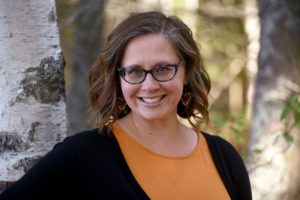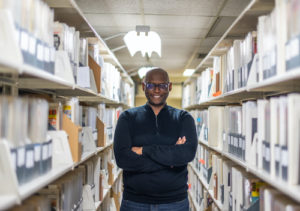
Kristin Arola is an Associate Professor in Writing, Rhetoric, and American Culture, and serves as affiliate faculty in American Indian and Indigenous Studies and Digital Humanities. Her work focuses on the intersections between American Indian rhetoric and multimodal pedagogy. Specifically, she explores best practices for teaching composing, be that composing through words, images, beads, quillwork, or any other form of meaning making. She believes best practices for teaching must acknowledge and honor all relations that afford and affirm our making. As such, her work is rooted in Anishinaabe community practices, histories, and futures. Along with numerous essays and book chapters, she the co-author of Writer/Designer: A Guide to Making Multimodal Projects, and the co-editor of CrossTalk in Comp Theory and Composing(Media)=Composing(Embodiment). She also currently serves as co-PI on a NSF grant, “Socio-Technological System Transitions: Michigan Community and Anishinaabe Renewable Energy Sovereignty,” the aim of which is to increase the capacity of communities across Michigan, including tribal nation communities, to make decisions about energy systems in ways that support their values and wellbeing. This project is focused on convergence across disciplines and communities, and coming to understand the socio-technological systems that shape, and are shaped by, decision making.
Discover more about Dr. Arola’s work at www.kristinarola.com.

Julian C. Chambliss is Professor of English and the Val Berryman Curator of History at the MSU Museum at Michigan State University. In addition, he is a co-director for the Department of English Digital Humanities and Literary Cognition Lab (DHLC) and faculty lead for the Graphic Possibilities Research Workshop in the Department of English. His research interests focus on race, culture, and power in real and imagined spaces. His recent writing has appeared in American Historical Review, Phylon, Frieze Magazine, Rhetoric Review, and Boston Review. An interdisciplinary scholar he has designed museum exhibitions, curated art shows, and created public history projects that trace community, ideology, and power in the United States.
He is co-editor and contributor for Ages of Heroes, Eras of Men: Superheroes and the American Experience, a book examining the relationship between superheroes and the American Experience (2013). His recent book projects include Assembling the Marvel Cinematic Universe: Essays on the Social, Cultural, and Geopolitical Domain (2018), Cities Imagined: The African Diaspora in Media and History (2018), and Reframing Digital Humanities: Conversations with Digital Humanists (2021). His 2021 exhibition Beyond the Black Panther: Vision of Afrofuturism in American Comics is a virtual exhibition hosted by the MSU Museum exploring Afrofuturist themed comics produced in the United States.
Discover more about Dr. Chambliss’s work at www.julianchambliss.com.